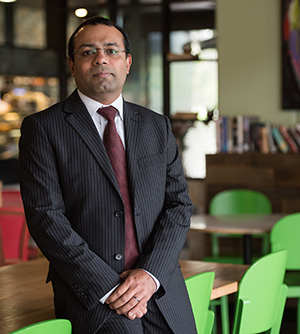
Princess Anne, MD—The University of Maryland Eastern Shore (UMES) has received another major research grant to study three areas that have become headline topics: artificial intelligence, climate change and sustainability, and health care outcomes. This follows on another major research grant on AI and a $2.5M “Driving Change” grant from the Howard Hughes Medical Institute.
“These grant awards will help many of our nation’s most inclusive and diverse colleges and universities expand their capacity to drive research and innovation, and propel more students to graduation day and fulfilling careers, said U.S. Secretary of Education Miguel Cardona. “This is how we Raise the Bar for college excellence and attainment in this country and close equity gaps in higher education that have no place in the 21st century.”
“This is a game-changer for UMES,” said Dr. Sandeep Gopalan, Vice Provost for Academic Affairs, and Principal Investigator (PI) of the grant project. “This grant allows us to substantially boost our research capabilities. We will conduct new research and create new knowledge about how three important global issues impact the African-American community. UMES,” he said, “will bring an African American perspective to this research and develop new knowledge about these issues through a different lens so that we may create new, more inclusive solutions.”
UMES is one of four universities who received this grant in a competitive national competition. The $4.6M will come over four years. Designed to help universities classified as R2 research institutions take steps to achieve coveted R1 status. As occurs at many other R1 research institutions, the Futures Institute will be pure research, allowing faculty and post-doctoral students to conduct research, publish results, and pursue new research on a full-time basis.
While all three areas receive considerable attention, their impact on minority communities is far less robust. There is a growing realization that not including those perspectives may skew products and services produced in these areas and their implementation with consumers.
In AI, for instance, this Institute may consider how its usage plays to stereotypes in criminal investigations, financial lending or the hiring process. For health care, the challenges women of color face in pre/post-natal care and infant mortality receive far less attention than their majority counterparts. While climate change is in the news on almost a daily basis, the impact of heat islands or industrial pollution or flooding in communities of color is not well understood.
Into this void steps UMES and the Futures Institute.
“At UMES, we will be driving change in the research community on these topics,” said UMES President Heidi M. Anderson. “We will bring fresh eyes, new perspectives, and determination to create new knowledge; knowledge that will be important to everyone but especially to communities that have been traditionally overlooked,” she said. “We won’t be content to simply publish research articles, we want to see that research implemented to the benefit of everyone.”
Dr. Gopalan, the founder of the Futures Institute, said that they will be looking at very specific research projects and will recruit and hire faculty and post-doctoral students from R1 research universities who specialize in these topics. He noted that the Institute builds on Dr Anderson’s longstanding passion for nurturing the next generation of scientists and helps fulfill the university’s mission. The Institute will also enjoy a unique relationship with some 15 different professors from R1 universities to do cutting-edge research in these areas, and with major research institutes such as the U.S. Naval Research Lab. These world-leading scientists have volunteered their time to mentor UMES research students and faculty.
The Institute plans to hire four assistant professors and eight doctoral/post-doctoral students at the outset. It will also employ a grant writer to help use this initial funding as a catalyst to generate additional research dollars in the future. Dr. Gopalan and his team are just beginning the research process.
For additional information, please contact Dr Gopalan at sgopalan@umes.edu

